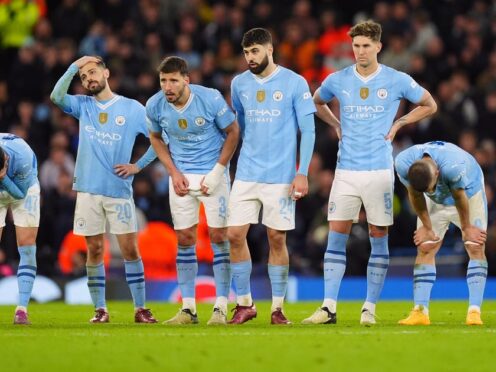The prospect of five English clubs competing in next season’s Champions League is hanging by a thread after Manchester City and Arsenal were knocked out of the continent’s premier club competition on Wednesday night.
Here, the PA news agency explains the situation.
Why is there an extra place?
An exciting new era for European club football awaits 🤩
Here’s how the #UCL will look from 2024/25 👇 pic.twitter.com/mEffFOpX2O
— UEFA Champions League (@ChampionsLeague) March 4, 2024
From this season, the two countries who collectively perform best in this season’s men’s European club competitions will each gain a European Performance Spot (EPS) for one of their clubs in the following season’s Champions League, which will feature a 36-team league phase from 2024-25 replacing the familiar eight groups of four.
For each of the best-performing countries, the EPS goes to the highest-finishing club in those countries who have not already qualified for the Champions League via their domestic performance. In England’s case, that would be the team finishing fifth – currently Tottenham.
How do the rankings look at the moment?

The rankings – known as the association club coefficient – are led this season by Italy. Germany were already ahead of England in the race for the second spot heading into the quarter-final second legs, but the exits of City and Arsenal – coupled with Bayern Munich and Borussia Dortmund making progress – have widened the gap.
Last Friday – after the Europa League and Conference League first legs had been played – Germany had 16.785 points compared to England’s 16.750, a gap of 0.035. On Thursday morning the gap had grown to 0.767, with Germany on 17.642 and England on 16.875.
How are the points worked out?

Teams gain points for wins (two) and draws (one) from the start of the group phase in all three of UEFA’s men’s club competitions. Teams also earn points for participation in the Champions League group phase and for making progress beyond certain rounds in all three competitions.
The association coefficient is calculated by working out an average score – dividing the total number of points the clubs win by the number of clubs representing that country in Europe. So in England’s case any points won by the Premier League representatives are divided by eight.
Can England still do it?

In theory yes. West Ham and Liverpool could still meet in the Europa League final if they can overturn first-leg deficits to Bayer Leverkusen and Atalanta respectively on Thursday night, and Aston Villa could still go all the way in the Conference League. That, coupled with the remaining German teams stumbling, means there is still very slim hope.
But Germany certainly have the edge and could even end up with six teams in next season’s Champions League. If Dortmund finish fifth in the Bundesliga but win the Champions League, it would be the second of those achievements which would secure them their Champions League place for 2024-25. The EPS would then be awarded to whoever finishes sixth – currently Eintracht Frankfurt.
